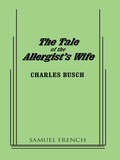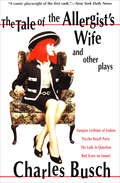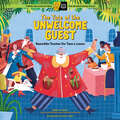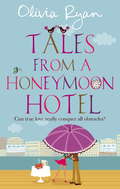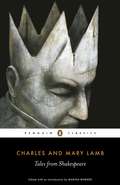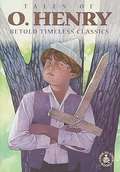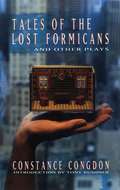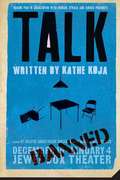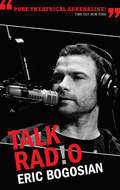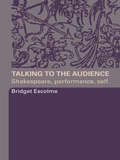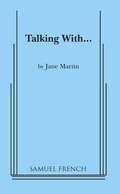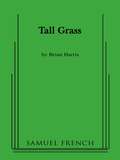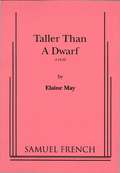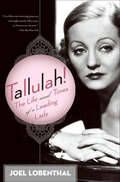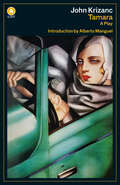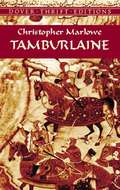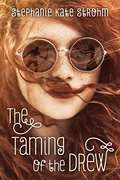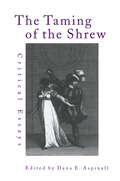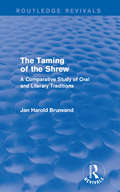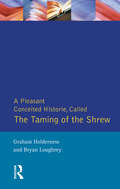- Table View
- List View
Tale Of The Allergist's Wife
by Charles BuschComedy / 2m, 3f / Interior / An award winning hit at the Manhattan Theatre Club and on Broadway,The Tale of the Allergist's Wife is a radical departure for the well known author of extravagant spoofs like Vampire Lesbians of Sodom and Psycho Beach Party. Marjorie Taub, the wife of a philanthropic allergist, is engulfed in a life crisis of Medea-like proportions. Her children are grown, her beloved therapist died recently and her mother, obesessed with bowel movements grates on her nerves. She tries to lose herself in a world of art galleries, foreign films and avant guard theatre, but finds she is barely able to rouse herself from her sofa. Her spirits suddenly soar when a fascinating and incredibly worldly friend from her childhood appears on her doorstep. Lee the savior that infuses Marjorie with life becomes Lee the unwelcome and sinister guest in short order. / Winner of the Outer Critics Circle John Gassner Award.
The Tale of the Allergist's Wife and Other Plays: Vampire Lesbians Of Sodom - Psycho Beach Party - The Lady In Question; Red Scare Of Sunset (Books That Changed the World)
by Charles BuschFour riotous plays in one volume from a winner of an Outer Critics Circle Award: “A comic playwright of the first rank.”—New York Daily NewsRenowned for his wicked camp humor and biting social satire, playwright and drag legend Charles Busch has delighted audiences both on and off Broadway. This book contains four of his works, among them Vampire Lesbians of Sodom, one of the longest-running plays in Off-Broadway history, of which the New York Times said “the female roles [Busch] creates are hilarious vamps, but also high comic characters…the audience laughs at the first line and goes right on laughing at every line to the end.”Also included is the Tony-nominated Broadway hit The Tale of the Allergist’s Wife—a comedy about a self-absorbed Upper West Side woman whose life is devoted to mornings at the Whitney, afternoons at the Museum of Modern Art, and evenings at the Brooklyn Academy of Music, until her world is transformed by a visit from a childhood friend; The Lady in Question, a tribute to 1940s Hollywood that is both funny and suspenseful; and Psycho Beach Party, a cross between Gidget and Spellbound.
The Tale of the Unwelcome Guest: Nasruddin Teaches the Town a Lesson; A Circle Round Book
by Rebecca SheirThe award-winning children&’s storytelling podcast Circle Round shares some of their most popular folktales in the new Circle Round book series, with each interactive book featuring a colorfully illustrated read-aloud story accompanied by storytelling prompts that explore an important theme. The Tale of the Unwelcome Guest invites kids to explore the value of acceptance and the danger of judging others by their appearance. The illustrations of Turkish illustrator Mert Tugen amplify the narrative text by Circle Round host and writer, Rebecca Sheir.
Tales From A Honeymoon Hotel: Number 3 in Series
by Sheila Olivia RyanThree newly-wed couples. Three honeymoons. One hotel. And the ultimate question: will true love really conquer all? Hotel Angelo, Croatia. Offers temptingly romantic views, unexpected exes and some serious doubts after 'I Do' Gemma and Andy Collins are childhood sweethearts and madly in love. Gemma is determined to have the perfect honeymoon after their perfect wedding - except that nothing seems to be going to plan. Soon she discovers that they are not the only honeymooners at the hotel, nor the only ones with a secret lying between them . . .Jo and Mark Weston, a young couple who should have stars in their eyes, seem oddly subdued - and strangely matched, while older couple Ruby and Harold Dimmock are finally free to enjoy their lives together, but guilty consciences cast a shadow on their golden years. Over their holiday, all three couples will discover that an immediate post-wedding happy-ever-after is not always guaranteed, but also that true love is worth fighting for . . .
Tales From A Honeymoon Hotel: a warm and witty holiday read about life after 'I Do' (Honeymoon)
by Sheila Norton Ryan)'An addictive summer read' Closer - 4* Three newly-wed couples. Three honeymoons. One hotel. And the ultimate question: will true love really conquer all?Hotel Angelo, Croatia. Offers temptingly romantic views, unexpected exes and some serious doubts after 'I Do' Gemma and Andy Collins are childhood sweethearts and madly in love. Gemma is determined to have the perfect honeymoon after their perfect wedding - except that nothing seems to be going to plan. Soon she discovers that they are not the only honeymooners at the hotel, nor the only ones with a secret lying between them . . .Jo and Mark Weston, a young couple who should have stars in their eyes, seem oddly subdued - and strangely matched, while older couple Ruby and Harold Dimmock are finally free to enjoy their lives together, but guilty consciences cast a shadow on their golden years. Over their holiday, all three couples will discover that an immediate post-wedding happy-ever-after is not always guaranteed, but also that true love is worth fighting for . . .Praise for Sheila Norton (writing as Olivia Ryan): 'Like a good cappuccino, there's more to this book than just an enjoyable, witty read' Katie Fforde'This is a delightful novel that many women will relate to' Woman's Weekly Fiction Special
Tales from Shakespeare
by Graham HoldernessIn this engaging new book, writer and critic Graham Holderness shows how a classic Shakespeare play can be the source for a modern story, providing a creative 'collision' between the Shakespeare text and contemporary concerns. Using an analogy from particle physics, Holderness tests his methodology through specific examples, structured in four parts: a recreation of performances of Hamlet and Richard II aboard the East India Company ship the Red Dragon in 1607; an imagined encounter between Shakespeare and Ben Jonson writing the King James Bible; the creation of a contemporary folk hero based on Coriolanus and drawing on films such as Skyfall and The Hurt Locker; and an account of the terrorist bombing at a performance of Twelfth Night in Qatar in 2005. These pieces of narrative and drama are interspersed with literary criticism, each using a feature of the original Shakespeare play or its performance to illuminate the extraordinary elasticity of Shakespeare. The 'tales' provoke questions about what we understand to be Shakespeare and not-Shakespeare, making the book of vital interest to students, scholars, and enthusiasts of Shakespeare, literary criticism and creative writing.
Tales from Shakespeare
by Charles and LambAs children, Charles and Mary Lamb took great delight in exploring their benefactor’s extensive library; as adults they began writing children’s books together that also appealed to all generations. In Tales of Shakespeare they wished to bring their favourite plays to life for children too young to read and appreciate Shakespeare’s work. This collection of twenty of Shakespeare’s stories begins with The Tempest, which explores themes of magic, power and reconciliation, and ends with Pericles, Prince of Tyre, an exotic play of love, loss and family ties. Between these two tales are twelve romances and comedies, all written by Mary, and six tragedies, all written by Charles. Each tale is told chronologically and retains much of Shakespeare’s lyricism, phrasing and rhythm. Together, they form a captivating and accessible introduction to the Bard’s work.
Tales of O. Henry (Retold Timeless Classics)
by Peg HallThese retold O. Henry tales, including The Ransom of Red Chief, The Gift of the Magi, Jimmy Hayes and Muriel, and The Cop and the Anthem, will delight readers.
Tales of Shakespeare
by Charles Lamb Mary LambTales meant to be submitted to the young reader as an introduction to the study of Shakespeare
Tales of the Lost Formicans and Other Plays
by Constance Congdon"One of the playwrights our country, and our language, has produced." - Tony Kushner"Quirky, disturbing, and inexplicably beautiful theatrical poetry." - Cary M. Mazer, Philadelphia City Paper"Congdon writes like a woman possessed." - Nels Nelson, New York Daily NewsAn immensely inventive and challenging writer, Constance Congdon is one of America's finest playwrights, endowed with great compassion, keen insight and an unfailing comic sensibility. Throughout the plays in her first collection, she demonstrates a range rare in writers in any age, from a somber meditation on life in the postnuclear age (No Mercy) to madcap social satire (Losing Father's Body), from an epic historical exploration of love and sexual identity (Casanova) to her most popular play to date (Tales of the Lost Formicans), acclaimed by William A. Henry III of Time magazine as "A travel guide to Middle America conducted by aliens from outer space... If not the best new play of recent years, surely the most imaginative."Constance Congdon's plays have been produced throughout the United States and abroad. She has received playwriting fellowships from the National Endowment for the Arts and the Rockefeller and Guggenheim foundations, and is the winner of Oppenheimer/Newsday, W. Alton Jones and L/ Arnold Weissberger awards. Congdon, an alumna of New Dramatists, currently teaches playwriting at Amherst College.
Talk
by Kathe KojaKit Webster is hiding a secret. Carma, his best friend, has already figured it out, and pushes him to audition for the high school play, Talk. When he's cast as the male lead, he expects to escape his own life for a while and become a different person. What he gets instead is the role of a lifetime: Kit Webster. In the play, Kit's thrown together with Lindsay Walsh, the female lead and the school's teen queen. Lindsay, tired of the shallow and selfish boys from her usual circle of friends, sees something real in Kit -- and wants it. But Kit's attention is focused on Pablo, another boy in school. The play is controversial; the parents put pressure on the school to shut it down. And when Kit and Lindsay rally to save "Talk", they find themselves deep into a battle for the truth: onstage, and inside themselves.
Talk Radio (TCG Edition)
by Eric Bogosian"Your fear, your own lives, have become your entertainment."--Talk Radio"More timely today than it was twenty years ago . . . Radio crackles with intensity."--Joe Dziemianowicz, New York Daily News"The most lacerating portrait of a human meltdown this side of a Francis Bacon painting. . . . This revival, like the original production, allows its star to grab an audience by the lapels and shake it into submission."--Ben Brantley, The New York TimesEric Bogosian's Talk Radio--his breakthrough 1987 Public Theater hit that was made into a film by Oliver Stone--has been revived in a "mesmerizing" (Newsday) production on Broadway, with Liev Schreiber playing the role of the late-night shock jock that Bogosian himself originated. The drama is set in the studio of Cleveland's WTLK Radio over the course of Barry Champlain's two-hour broadcast, being scrutinized that night by producers with an interest in taking the show national, and fueled as always by coffee, cocaine, and Jack Daniel's. Barry's jousts with his unseen callers--ranging from a white supremacist to a woman obsessed with her garbage disposal--are peppered with insights into his character from his ex-deejay pal and his sometime girlfriend/producer, and punctuated with a transformative visit from an embodied voice. Eric Bogosian is a writer and actor who over the last twenty years has authored five full-length plays and created six full-length solos for himself, including subUrbia; Sex, Drugs, Rock & Roll; Pounding Nails in the Floor with My Forehead;and Drinking in America. He is the recipient of three OBIE Awards and a Drama Desk Award, and has toured throughout the United States and Europe.
Talking to the Audience: Shakespeare, Performance, Self
by Bridget EscolmeThis unique study investigates the ways in which the staging convention of direct address - talking to the audience - can construct selfhood, for Shakespeare's characters. By focusing specifically on the relationship between performer and audience, Talking to the Audience examines what happens when the audience are in the presence of a dramatic figure who knows they are there. It is a book concerned with theatrical illusion; with the pleasures and disturbances of seeing 'characters' produced in the moment of performance.Through analysis of contemporary productions Talking to the Audience serves to demonstrate how the study of recent performance helps us to understand both Shakespeare's cultural moment and our own. Its exploration of how theory and practice can inform each other make this essential reading for all those studying Shakespeare in either a literary or theatrical context.
Talking With...
by Jane MartinMonologues Jane Martin. Characters: 11 female. Bare Stage.. These extraordinary monologues received a standing ovation at Louisville's Actors Theatre. Idiosyncratic characters amuse, move and frighten, always speaking from the depths of their souls. They include a baton twirler, a fundamentalist snake handler, an ex rodeo rider and an actress willing to go to any length to get a job. . 1982 winner of the American Theatre Critics Association Award for Best Regional Play. . "A dramatist with an original voice ... [and] gladsome humor." N.Y. Times . "With Jane Martin, the monologue has taken on a new poetic form, intensive in its method and revelatory in its impact." Philadelphia Inquirer
Tall Grass
by Brian HarrisDark Comedy / Flexible Casting; 2m, 1f or 6m, 3f / Simple Sets Tall Grass is a dark comedy comprised of three one-act plays. Each play requires two males and a female and the same three actors can play the roles for each play. THE BUSINESS PROPOSAL begins with a botched marriage proposal by a nice young man to his type-A girlfriend, who instead informs him that she has just accepted a position to become his boss. Over the next six-months the two try to sort out what they really want out of their professional and personal lives. The solution comes as a surprise, both to themselves and to the audience. The play also features a comic waiter and some voice-overs which can be done by the same actor. THE GERBIL is the story of a burglar caught breaking into the home of a dysfunctional couple, whose love for their daughter is the glue keeping their marriage together. The brutal ending reveals the harm their marriage has taken on the daughter, although she never appears on stage. In TALL GRASS we find an octogenarian couple fighting to maintain their independence. The arrival of a mysterious social worker tests the true extent of their resolve.
Taller Than a Dwarf
by Elaine MayComedy / 5m, 4f, 1 boy / Interior / Matthew Broderick and Parker Posey starred on Broadway as Howard and Selma, just another urban, Jewish, almost generic white couple from Queens, until the mundane stresses of a leaky shower and a citation for littering overwhelm them and Howard takes to bed. His parents, mother-in-law and boss hysterically elevate his childish rebellion to Civil Disobedience worthy of Thoreau in this skewed comic version of an urban angst from veteran humorist Elaine May.
Tallulah!: The Life and Times of a Leading Lady
by Joel LobenthalOutrageous, outspoken, and uninhibited, Tallulah Bankhead was an actress known as much for her vices -- cocaine, alcohol, hysterical tirades, and scandalous affairs with both men and women -- as she was for her winning performances on stage. In 1917, a fifteen-year-old Bankhead boldly left her established Alabama political family and fled to New York City to sate her relentless need for attention and become a star. Five years later, she crossed the Atlantic, immediately taking her place as a fixture in British society and the most popular actress in London's West End. By the time she returned to America in the 1930s, she was infamous for throwing marathon parties, bedding her favorite costars, and neglecting to keep her escapades a secret from the press. At times, her notoriety distracted her audience from her formidable talent and achievements on stage and dampened the critical re-sponse to her work. As Bankhead herself put it, "they like me to 'Tallulah,' you know -- dance and sing and romp and fluff my hair and play reckless parts." Still, her reputation as a wild, witty, over-the-top leading lady persisted until the end of her life at the age of sixty-six.From her friendships with such entertainment luminaries as Tennessee Williams, Estelle Winwood, Billie Holiday, Noël Coward, and Marlene Dietrich, to the intimate details of her family relationships and her string of doomed romances, Joel Lobenthal has captured the private essence of the most public star during theater's golden age. Larger-than-life as she was, friends saw through Bankhead's veneer of humor and high times to the heart of a woman who often felt second-best in her father's eyes, who longed for the children she was unableto bear, and who forced herself into the spotlight to hide her deep-seated insecurities.Drawn from scores of exclusive interviews, as well as previously untapped information from Scotland Yard and the FBI, this is the essential biography of Tallulah Bankhead. Having spent twenty-five years researching Bankhead's life, Joel Lobenthal tells her unadulterated story, as told to him by her closest friends, enemies, lovers, and employees. Several have broken decadelong silences; many have given Lobenthal their final interviews. The result is the story of a woman more complex, more shocking, and yet more nuanced than her notorious legend suggests.
Tamara
by John KrizancAvailable for the first time in over thirty years, John Krizanc’s internationally acclaimed play redefined the limits of theatre with its haunting tale of art, sex, violence, and political intrigue in Fascist Italy. In the late twenties the poet, war hero, and lothario Gabriele d’Annunzio waits in his opulent villa — a gift from Benito Mussolini in return for his political silence — for the arrival of the artist Tamara de Lempicka, who is to paint his portrait. What follows is a tale of art, sex, violence and the meaning of complicity in an authoritarian state. The action is directed by the reader/audience member, who decides which characters to follow and which narratives to experience. John Krizanc’s masterpiece redefined theatre and won six L.A. Drama Critics Circle Awards, six Dora Mavor Moore Awards, six Drama-Logue Awards, and six Mexican Association of Theatre Critics, and Journalists Awards for its original productions. Now available in a handsome new A List edition, Tamara is an astonishing piece of experimental art and a penetrating look into ethical choices in times of encroaching autocracy.
Tamburlaine: In Two Parts (classic Reprint) (Dover Thrift Editions: Plays)
by Christopher MarloweOne of the greatest English playwrights, Christopher Marlowe received the scholarly compliment of having long been considered the author of some plays now attributed to Shakespeare. Marlowe's remarkable inventiveness and powers of poetic expression enabled him to render his first play, Tamburlaine, the relatively new form of English blank verse, establishing the form for later Elizabethan dramatic writing. This heroic epic, his most ambitious work, was also the first genuine English tragedy.Produced around 1587, the two-part romantic drama derives from the historical figure of Tamerlane (1336–1405), a Mongol warrior whose conquests and tyrannical rule extended from the Black Sea to the Upper Ganges. In Part I, Tamburlaine represents the best and most admirable qualities of the Renaissance man — his relentless rise to greatness, his ability to defy the odds and his determined pursuit of all life's possibilities. The first part concludes with the hero at the zenith of his powers, with vivid descriptions of his military victories and the passionate courting of a rival's captive daughter; in Part II, however, Tamburlaine's ambition overrides his better nature, and his greed and vanity ultimately lead to his ruin.Ideal for classroom use, this volume will also be a welcomed addition to the libraries of anyone fond of English literary classics.
The Taming of the Drew
by Stephanie Kate StrohmCass McKay has been called stubborn, temperamental, difficult, and that word that rhymes with "witch” more times than she cares to count. But that’s all about to pay off. She has finally landed the role she was born to play-Kate, in The Taming of the Shrew-in the summer apprentice program of a renowned Shakespeare theater company in the forests of Vermont.But Cass can barely lace up her corset before her troubles begin. Her leading man, Drew, is a complete troll, and he’s going to ruin Cass’s summer. Even worse, Cass’s bunkmate Amy has somehow fallen head over heels for Drew. Cass can’t let Amy throw herself at a total jerk, so she comes up with a genius plan to give Drew the personality makeover he so desperately needs: they’ll tame Drew just as Petruchio tames Kate! But as Shakespeare’s classic plays out offstage, Cass finds it harder and harder to resist falling for Drew herself.The best kind of entertainment, The Taming of the Drew is smart, funny, fresh, and original. You’re going to love this badass heroine and her friends. You might even end up liking Drew, too.
The Taming of the Shrew: Critical Essays (Shakespeare Criticism)
by Dana E. AspinallThis volume is a comprehensive collection of critical essays on The Taming of the Shrew, and includes extensive discussions of the play's various printed versions and its theatrical productions. Aspinall has included only those essays that offer the most influential and controversial arguments surrounding the play. The issues discussed include gender, authority, female autonomy and unruliness, courtship and marriage, language and speech, and performance and theatricality.
The Taming of the Shrew: A Comparative Study of Oral and Literary Versions (Routledge Revivals)
by Jan Harold BrunvandWilliam Shakespeare’s The Taming of the Shrew has succeeded in surviving in contemporary culture, and has even managed to penetrate to the most modern media of mass communications. This book, first published in 1991, examines some of the different literary and oral versions of The Taming of the Shrew. This book is ideal for students of literature, drama, and theatre studies.
Taming of the Shrew: First Quarto of "Taming of a Shrew" (Shakespearean Originals--first Editions Ser.)
by Graham Holderness Bryan LoughreyFirst Published in 1992. This series puts into circulation single annotated editions of early modern play-texts whose literary and theatrical histories have been overshadowed by editorial practices dominant since the eighteenth century. The text contained in this volume is not what we know as Shakespeare's The Taming of the Shrew, modern editions of which play are all derived from the text printed in the 1623 First Folio edition of Shakespeare's works. The present text is an edition of the play published in 1594 under the title The Taming of a Shrew, which has always been denied the authorising signature of 'Shakespeare', and regarded as an earlier version by another dramatist or as a pirated and corrupt 'memorial reconstruction' of Shakespeare's The Taming of the Shrew.
